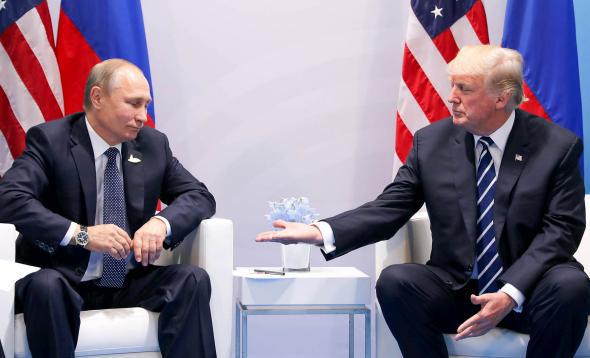We may never know exactly what was said in the much-anticipated meeting on Friday between Donald Trump and Vladimir Putin. Secretary of State Rex Tillerson is famously taciturn, Russian Foreign Minister Sergey Lavrov is unreliable, the two presidents have their agendas, and there were no official note-takers unless you count the translators, whose jottings rarely leak.
Still, a few observations can be drawn from the reports put out so far. First, Putin emerged as the winner. At a press briefing after the meeting, Tillerson said that Trump did raise—more than once—the charge that Russia interfered in the 2016 election. However, Lavrov told reporters that Trump accepted Putin’s denial. Perhaps Lavrov was exaggerating, but Tillerson did say the two presidents agreed to “move forward” and not “re-litigate the past”—which amounts to the same thing.
Hear this article on Slate Voice! slate.com/voice
In other words, Putin did not, and apparently will not, pay any price for his information-warfare campaign against American democracy. In fact, Tillerson said that Trump merely “noted” the domestic concerns about the charges, which could prove “a substantial hindrance” to future Russian–American relations. That’s very different from pressuring or even endorsing the accusation against Russia, which has been leveled by the entire U.S. intelligence community. Putin must also have noticed that hours before their meeting, Trump again voiced skepticism not only about the accusation but about the general competence of his intelligence agencies, likening their conclusions about Russian hacking to their 2002 warnings about Iraqi weapons of mass destruction.
Tillerson added that the two leaders agreed to create a “framework” for talks on cybersecurity, including a pledge of non-interference in future elections. But this is a smokescreen given Putin’s failure to acknowledge his past activity—and Trump’s failure to press him on it.
Putin and Trump were said to have spent much of their 2 ¼–hour meeting talking about, and agreeing on, a ceasefire in southwest Syria. Tillerson and Brett McGurk, the U.S. envoy to the coalition fighting ISIS, have been working on this ceasefire for some time with their Russian and Jordanian counterparts, and if it holds, it could have more far-reaching consequences. But Tillerson acknowledged that many details still need to be worked out: whose security forces enforce the ceasefire; whether this cooperation can be extended to other parts of Syria; what its implications are for a joint fight against ISIS, how long Bashar al-Assad remains in charge (Tillerson said Assad must go, while the Russians have other ideas); and whoever rules Damascus, how a peaceful settlement can be forged in this country of multiple civil and ethnic wars. In short, this ceasefire—which, at best, is temporary and covers only one of the many battles, namely between Assad’s regime and a specific U.S.-backed militia—hardly signals that peace is at hand.
The conflict in Ukraine was also brought up, but in Tillerson’s account, only to the extent that the United States has appointed, at Russia’s urging, a special envoy to the country, namely Kurt Volker, a career diplomat and former U.S. ambassador to NATO. If the leaders discussed sanctions, the disposition of Crimea, or a timetable for the withdrawal of Russian troops from Eastern Ukraine, neither Tillerson nor Lavrov said anything about it.
This seemed to be, in some ways then, a serious diplomatic session, or at least as serious as might have been imagined under the strained circumstances. Yet at the same time, Putin’s goals were at once more ambitious and more fully met than Trump’s. First, Putin came off as the full peer of the president of the United States, an enormous accomplishment given the relative weakness of his country and the thorough corruption of his regime. (The photo of Trump extending his hand to shake Putin’s—not the other way around—will be seen back in Russia, and perhaps elsewhere, as a signifier, as will his describing their meeting as “an honor.”) More important still, Putin won shrugged acceptance of his role in skewing an American presidential election and might interpret this as tacit permission to try again the next time—as long as he skews in a direction to Trump’s liking.
By contrast, Trump came off as able to hold his own in a two-hour-plus meeting with the likes of Putin with, as far as we know, no big gaffes or missteps. That may be triumph enough for Trump—look for his aides to trumpet the fact—but it’s a low bar at a global forum where American presidents are expected to lead, not merely endure.
